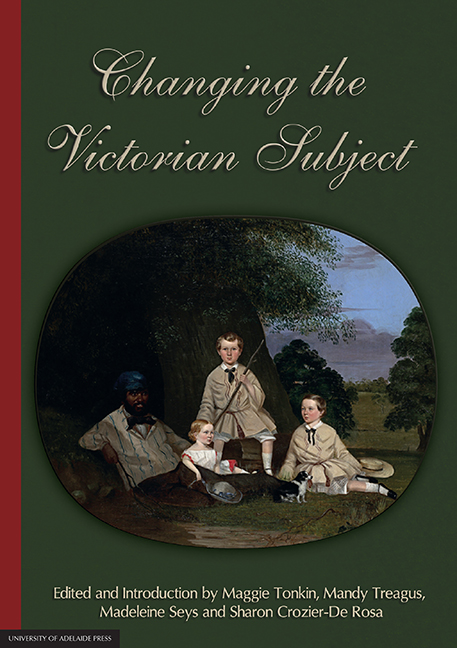Book contents
- Frontmatter
- Contents
- Notes on Contributors
- 1 Re-visiting the Victorian subject
- 2 Queen Victoria's Aboriginal subjects: a late colonial Australian case study
- 3 Identifying with the frontier: Federation New Woman, Nation and Empire
- 4 A ‘Tigress’ in the Paradise of Dissent: Kooroona critiques the foundational colonial story
- 5 The making of Barbara Baynton
- 6 A literary fortune
- 7 Olive Schreiner's From Man to Man and ‘the copy within’
- 8 Guy Boothby's ‘Bid for Fortune’: constructing an Anglo-Australian colonial identity for the fin-de-siècle London literary marketplace
- 9 The scenery and dresses of her dreams: reading and reflecting (on) the Victorian heroine in M.E. Braddon's The Doctor's Wife
- 10 The woman artist and narrative ends in late-Victorian writing
- 11 Miss Wade's torment: the perverse construction of same-sex desire in Little Dorrit
- 12 ‘All the world is blind’: unveiling same-sex desire in the poetry of Amy Levy
- 13 From ‘Peter Panic’ to proto-Modernism: the case of J.M. Barrie
13 - From ‘Peter Panic’ to proto-Modernism: the case of J.M. Barrie
Published online by Cambridge University Press: 05 December 2014
- Frontmatter
- Contents
- Notes on Contributors
- 1 Re-visiting the Victorian subject
- 2 Queen Victoria's Aboriginal subjects: a late colonial Australian case study
- 3 Identifying with the frontier: Federation New Woman, Nation and Empire
- 4 A ‘Tigress’ in the Paradise of Dissent: Kooroona critiques the foundational colonial story
- 5 The making of Barbara Baynton
- 6 A literary fortune
- 7 Olive Schreiner's From Man to Man and ‘the copy within’
- 8 Guy Boothby's ‘Bid for Fortune’: constructing an Anglo-Australian colonial identity for the fin-de-siècle London literary marketplace
- 9 The scenery and dresses of her dreams: reading and reflecting (on) the Victorian heroine in M.E. Braddon's The Doctor's Wife
- 10 The woman artist and narrative ends in late-Victorian writing
- 11 Miss Wade's torment: the perverse construction of same-sex desire in Little Dorrit
- 12 ‘All the world is blind’: unveiling same-sex desire in the poetry of Amy Levy
- 13 From ‘Peter Panic’ to proto-Modernism: the case of J.M. Barrie
Summary
The author may be dead as far as Roland Barthes is concerned, but the news is yet to hit the street. Probably nothing speaks more loudly of the gap between academic literary criticism and the culture of reading outside the academy than the latter's continuing obsession with the author. Barthes's claim that the author is neither the originator nor the final determiner of textual meaning has assumed the status of orthodoxy in scholarly poetics. Whilst the early austerity has faded somewhat, such that discussion of the historical specificity of the author is no longer scorned in literary studies, the Romantic privileging of the author as the ‘fully intentional, fully sentient source of the literary text, as authority for and limitation on the “proliferating” meanings of the text’, as Andrew Bennett puts it (55), has never regained its former currency. Yet outside the academy, public fixation on the figure of the author has never been greater: the author is now a communal fetish.
J.M. Barrie, famed for his authorship of Peter Pan, is a case in point. Peter Pan has long been neglected within the academy, but recently the tide has turned and it has become the focus of renewed scholarly attention. However, as Peter Hollindale notes, there are ‘two co-existent stories’ about Peter Pan, ‘each with the capacity to distort or confuse our understanding of the other’ (‘A Hundred Years’ 199), for alongside the renewed scholarly attention to Barrie's best-known work has emerged a public fixation on his life, which is manifest in popular cultural forms such as biography, film, popular science books and websites.
- Type
- Chapter
- Information
- Changing the Victorian Subject , pp. 259 - 281Publisher: The University of Adelaide PressPrint publication year: 2014



